I don't see why it wouldn't function correctly with the loop. There's no air in the cooling system, so the pump does all the work for moving the liquid around. As long as the cap is the highest point in the system so it can be easily filled and bled, you should be good.
Announcement
Collapse
No announcement yet.
Raf99 : 1993 Accord EX
Collapse
X
-
Well... guess i didn't expect this. Trying to fill the car with coolant and I realized because of the upper rad hose loop the coolant will not flow into the block. The radiator is full but i have lots left to pour in. Usually I hear it filling the block. So my question to ya'l; will the pump suck the coolant through and force things to circulate?
Comment
-
Cannot squeeze braided hose.Originally posted by sonikaccord View PostNot if there is air trapped in the system. Have you tried squeezing the upper hose to try and get the coolant to move?
Comment
-
Ended up tilting the hose enough to get all of the coolant that came out of it into the system. But I will admit I have my concerns over the system being able to push the coolant through this loop when I put it back to dipping downwards. Anyone have any thoughts? What's the pressure here....
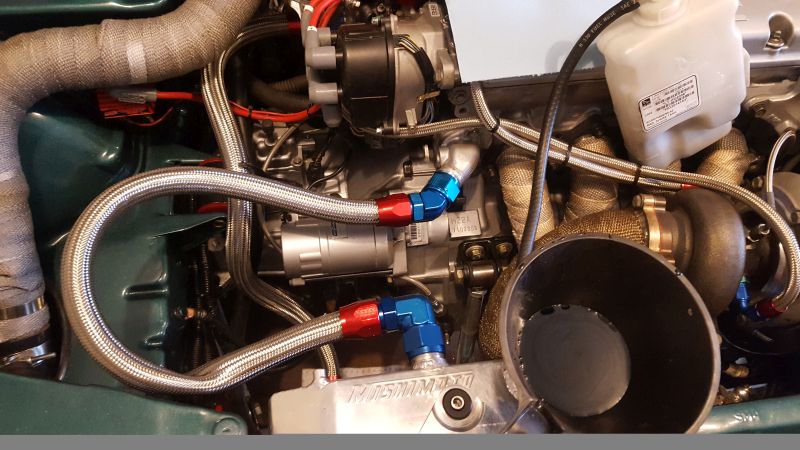
Comment
-
Now that i think about this, i think I just created a way for air to not escape the head. Does air in the head of the block escape through the rad opening?
I know about the lower bleeder valve and I have coolant coming out of that. But after that the instructions say to leave the upper rad cap off to let air out. Is the air coming from the block ? If so... it's not going to make it with this hose. But I've seen others who use 90deg. angles....
Comment
-
Squeeze harder
The lower bleeder valve? Is that the one by the thermostat? If you have a steady stream of coolant coming out of that, then your block shouldn't have any air left which is good that means the pump impeller is submerged in coolant. There may be some air pockets left in the cylinder head that *should* get pushed out once you start the engine. I wouldn't worry about the loop as long as there isn't any large air bubbles in the system.
System pressure is determined by the rad cap. I haven't been through this thread in a while so I don't know if you are running a stock cap.
Comment
-
No stock cap, Mishimoto rad & cap. I've been reading for a couple hours if this is allowed or not. Everything I'm reading says the system will push the air through and to the rad cap opening where air will escape.Originally posted by sonikaccord View PostSqueeze harder
The lower bleeder valve? Is that the one by the thermostat? If you have a steady stream of coolant coming out of that, then your block shouldn't have any air left which is good that means the pump impeller is submerged in coolant. There may be some air pockets left in the cylinder head that *should* get pushed out once you start the engine. I wouldn't worry about the loop as long as there isn't any large air bubbles in the system.
System pressure is determined by the rad cap. I haven't been through this thread in a while so I don't know if you are running a stock cap.
Comment
-
-
Well......
We started Sally today, first time since she was put away and we have good news and bad news.
Good news:
- The valve adjustment seems to be OK. No clunking and clanging. I think we are safe.
- The negative battery cable I ran to the trans is ok too
Bad news:
- The PS hose broke and leaked all the PS fluid on the floor. What a mess! And F U mishimoto! You made a fuckin PS reservoir that you can't find a fuckin hose that fits it. Uggg. The end of the PS pump is one size and the other end of that hose needs to go on the Mishimoto PS reservoir which is a different size. Like WTF....
- The coolant system does not work. It simply pushed the fluid from the bottom of the rad to the top and out the top with the rad cap off. It couldn't push the coolant through the upper rad hose with the current bend in it. Now I could try with the cap on and get a vacuum system to take the air out but how do I know it's pushing the fluid to the block / through the upper rad hose?
It simply pushed the fluid from the bottom of the rad to the top and out the top with the rad cap off. It couldn't push the coolant through the upper rad hose with the current bend in it. Now I could try with the cap on and get a vacuum system to take the air out but how do I know it's pushing the fluid to the block / through the upper rad hose?
Any ideas anyone?
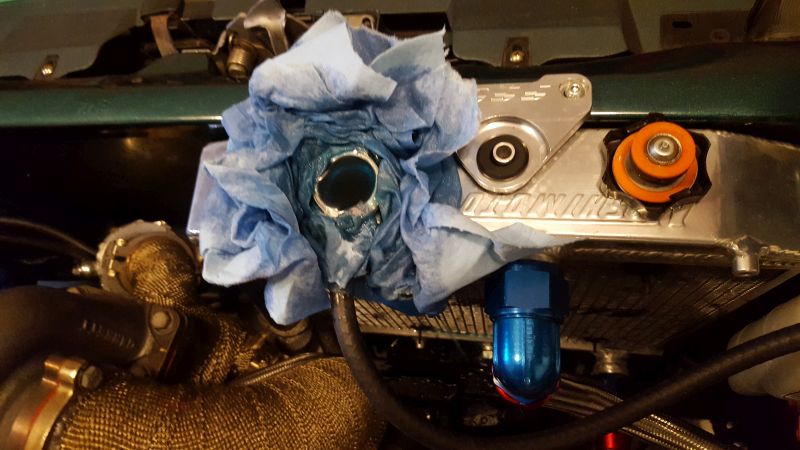
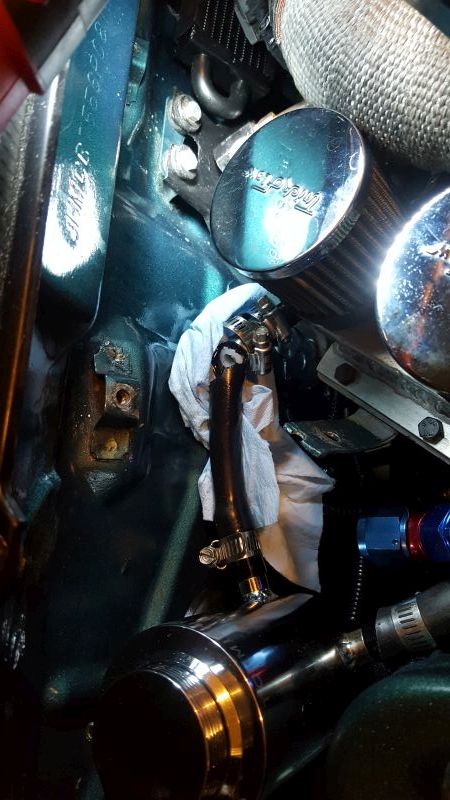
Comment
-
If the system is full and air-tight, the fluid will have nowhere else to go but continue through the engine's cooling circuit. There are ups and downs in there that the coolant has to travel through even without your loop. After all, the water pump is at the top of the block, and yet the cylinder jackets below, and stock throttle body above, are both cooled. Blow water through a crazy straw and it's still going to come out the other end.Originally posted by Raf99 View PostNow I could try with the cap on and get a vacuum system to take the air out but how do I know it's pushing the fluid to the block / through the upper rad hose?
With your loop, I was wondering if it would be possible to fill it by putting the radiator cap on after filling the radiator up to the inlet neck, and then using the radiator-end of the upper hose as a filler neck for the block side (straighten it out and hold it up for the filling process, obviously). If that doesn't fill it enough to bleed through the valve, the engine could probably be bumped or ran for a few seconds to get the water pump to work the coolant deeper into the system until you reach that point. Just an idea...
If you're sick of dealing with it, just take the radiator and upper neck into a shop to have both necks re-welded at angles that allow for a simple, sideways-V-routed hose.Last edited by CyborgGT; 05-07-2019, 12:54 AM.
Comment
-
I hear ya. When trying to fill the radiator it wouldn't even take all the coolant. The fluid won't flow up the lower rad (to the thermostat) and the upper rad hose won't take the fluid due to the dip. Had a friend over after work and he had a good point too. We also have the coolant lines for the turbo to deal with. And at same point the coolant system will be affected. example: assume we had a 5-10' loop dipping down; at some point there has to be an affect on the coolant capability or flow rate. And the better the flow the better the cooling.
Either way.... I removed the hose today. I'm going to go with a horse-shoe sideways loop. I'll buy another 90deg. and try again with another idea. It's obvious with the current setup I'm going to have a hard time getting air out. I'll also have a hard time knowing if coolant flow is working to it's full capacity. I just foresee a world of headaches....
I did try the fake braided line over the rubber hose but it looks cheap and fits horribly........
Comment

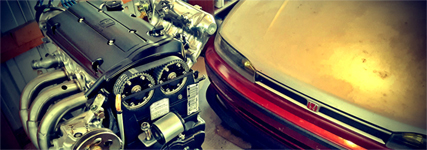




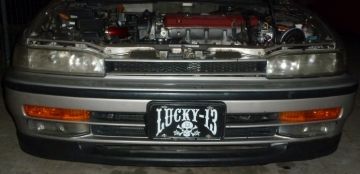
Comment